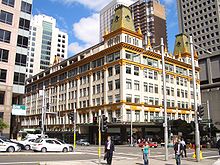|
M v R
M v R or M v The Queen is an Australian legal case decided in the High Court.[1] It is an important authority in the field of criminal law, for the circumstances in which it is permissible for a jury's guilty verdict to be overturned by a judge.[2][3] The case involved an appeal against criminal conviction by a father, against allegations of sexual assault and rape by his daughter. His appeal was allowed by majority. Background M was convicted in the District Court in Sydney. The counts found against him were two of indecent assault, and three of sexual intercourse. Each was allegedly committed against the complainant; one of his biological daughters. The daughter was 13 years old at the time of the alleged offending. An appeal against conviction was made to the Court of Criminal Appeal on the ground that his conviction was unsafe and unsatisfactory. That appeal was dismissed. Sully J, one of the three judges presiding, said of the appeal;
The other two justices, Cripps JA and Finlay J, agreed with Sully J in dismissing the appeal; but dissociated themselves from his expressed feeling of anxiety or discomfort.[5] M was granted special leave to appeal his conviction at the High Court.[1] JudgmentsMajority judgementDiscussion of principleThe majority discussed at length previous judicial commentary on when it was appropriate, as a matter of law, for criminal appellate courts to overturn a conviction on the unsafe or unsatisfactory ground. This included a discussion of Lindy Chamberlain's unsuccessful appeal.[6] They found that the relevant question a court must ask itself, is whether; 'it thinks that upon the whole of the evidence it was open to the jury to be satisfied beyond reasonable doubt that the accused was guilty'.[7] However, it also found that courts must have full regard to the jury's role as the primary body to be entrusted with a determination of guilt or innocence, and of the benefit jurors have in seeing and hearing from witnesses. They then set out a description of what that evaluation entails;
The majority made note of the anxiety and discomfort experienced by Sully J, saying it was indicative of a 'doubt (which) appears to have been engendered by shortcomings in the evidence, which are not met by reference to the jury's advantage in seeing the witnesses'. Sully J was therefore found to have made an error at law for having concluded that the appeal should be dismissed. The principles outlined were then applied to the facts of the case. Application to evidenceThe prosecution called two medical practitioners to examine the complainant. The first found that the complainant's hymen was intact, and found this to be inconsistent with a rape by forced vaginal penetration. The second medical practitioner found there was no evidence 'one way or the other' of physical penetration. In cross-examination it became an issue that the complainant's account of the rape on Saturday 8 September 1990, included sitting and watching television with the appellant; as the complainant had claimed to have been watching a western movie. She was challenged by the defense that no such movie had been programmed for that evening. Similarly, the complainant testified that she had heard her mother watching tennis on the TV, on the night of the 22nd of September; although it was put to her in cross that no tennis was programmed for that night. Additionally, the appellant's wife testified that her bedroom was within hearing distance of the kitchen (she claimed to be cleaning the kitchen on the night of the 22nd); and her bed was squeaky. The complainant agreed in cross that the bed 'must have squeaked an awful lot when (her) father was attacking (her)'. The complainant's evidence was found not to have been corroborated by anyone; and to have been contradicted by the first medical examiner. The month-long delay before the she made a complaint, and 'apparent equanimity' with which she was found to have conducted herself during the family barbecue the day following the alleged penetration on the 22nd; according to the court 'suggested the need for careful scrutiny of the allegations which she made against the appellant'. The court also cast aspersions on the complainant's credibility for a complaint she had made to a medical registrar 2 years prior (when she was 11). In that complaint she had alleged that her younger half-sister (then 8 years old) had tormented her by touching her genital area in an aggressive manner.[10] The majority decided that those accusations had 'revealed a capacity on the part of the complainant to make a complaint of a sexual nature to a person in authority about a member of her family'.[11] The appellant was found to have co-operated fully with the police investigation, and to have consistently denied the allegations against him. He gave evidence on oath denying the allegations, and was found to have not been discredited in 'any way' by cross-examination. Character evidence had been led on the appellant's behalf, including from people who had, with full knowledge of the allegations made against the complainant, permitted children to remain overnight at the appellant's home. However, what the majority found most important to their acquittal was; [12]
In light of all of the evidence, it was found that:
For that reason the majority jointly decided to allow the appeal. SignificanceM. v R is one of the most cited cases in Australian law, as it is binding authority for the nature of assessment that criminal appeals courts must undertake for the unsafe and unsatisfactory ground of appeal. As of September 2020, M v R is the 22nd most cited High Court case, according to LawCite.[13][14] See alsoReferences
|
||||||||||||||||||||
